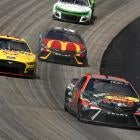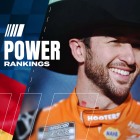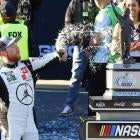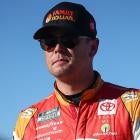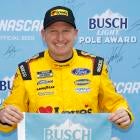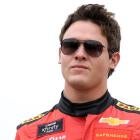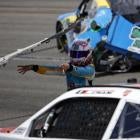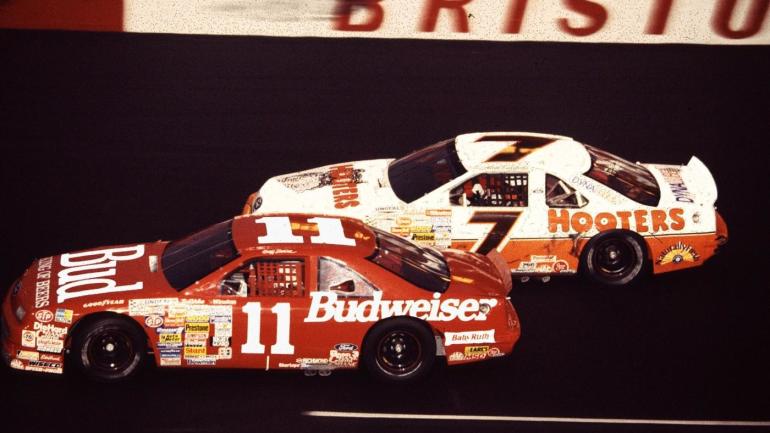
In NASCAR, one of the sure signs of springtime and the forward movement of the world is the sport's annual first trip of the season to Bristol Motor Speedway in Bristol, Tenn. This year, however, that trip to Bristol also presents a trip back in time.
With Bristol's spring race returning to its traditional concrete surface after three years on dirt from 2021 to 2023, the track has decided to make this weekend's Food City 500 a "throwback weekend," celebrating the early 1990s with a specific focus on 1992 -- the first year of Food City's sponsorship of Bristol's spring event. The red and white walls of NASCAR's Winston Cup era will adorn the track, and nods to the past will be present all throughout the facility -- from legendary NASCAR broadcaster Dr. Jerry Punch on the at-track television to Bill Goldberg as an event dignitary to even vehicles from movies like "Back to the Future" and "Jurassic Park" out on display in the Fan Zone.
With the time portal open and active in Bristol, CBS Sports has decided to make a trip through time to the year 1992 to not only recap that year's Food City 500 and battle for the Winston Cup championship, but also set the scene of what else was going on in the greater sports world beyond the still-growing sport of NASCAR.
Beautiful Thunder Valley 😍
— Bristol Motor Speedway (@ItsBristolBaby) March 13, 2024
🎟 https://t.co/jRTYOMmrOx#ItsBristolBaby #NASCAR pic.twitter.com/TPHICvC8dn
What in the wide, wide world of sports was going on!?
- The Food City 500 was slotted neatly between two major happenings on the American sports calendar. The night before the race, Duke prevailed over Indiana in a Final Four game in the semifinals of the men's basketball NCAA Tournament in Minneapolis, Minn., and they would proceed to win the national championship over Michigan the Monday after the race. That Monday also marked Opening Day for Major League Baseball, which featured the Baltimore Orioles' first-ever game at the newly-constructed Oriole Park at Camden Yards. The Orioles defeated the Cleveland Indians by a score of 2-0, with Rick Sutcliffe pitching a shutout.
- 1992 was the last year before unrestricted free agency was introduced to the NFL, and it saw a major turning point in a legal saga to try and introduce the current model of free agency. On Sept. 24, U.S. District Court Judge David Doty awarded Philadelphia Eagles tight end Keith Jackson, New England Patriots defensive end Garin Veris, Cleveland Browns wide receiver Webster Slaughter and Detroit Lions running back D.J. Dozier a temporary restraining order, allowing them to become unrestricted free agents for five days until an evidentiary hearing could be heard. Jackson (Miami Dolphins), Slaughter (Houston Oilers) and Veris (San Francisco 49ers) would proceed to sign with new teams.
- 10 total NBA games were played on April 5, two of which saw All-Stars who are now NASCAR car owners finish as the game's highest scorers. 23XI Racing co-owner Michael Jordan scored 26 points in a Chicago Bulls 97-86 loss to the Boston Celtics, while JTG Daugherty Racing co-owner Brad Daugherty scored 22 points in a 97-93 win by the Cleveland Cavaliers over the New York Knicks.
- The push for the Stanley Cup playoffs was on in the NHL in a league that looked different from top to bottom for the 1991-92 season. Not only had the NHL expanded to 22 teams with the addition of the San Jose Sharks, but the Stanley Cup Finals would wind up extending into June for the first time ever. It wouldn't make it past the first day of June, however, as the Pittsburgh Penguins completed a 4-0 sweep of the Chicago Blackhawks to repeat as Stanley Cup champions.
- 1992 was also an Olympic year, notable in that it saw both the Winter Olympics in Albertville and the Summer Olympics in Barcelona. For the United States, the most memorable aspect of the 1992 Olympics was the "Dream Team" in basketball, which won the gold medal featuring NBA superstars like Michael Jordan, Charles Barkley, Magic Johnson, Larry Bird and more.
- The author of this article you're reading ... wasn't born yet! I was a work in progress throughout the 1992 Winston Cup season, and a little over a month and change after Alan Kulwicki won the tilte in Atlanta, I was born on Christmas Eve 1992 in Mount Kisco, N.Y.
The 1992 Food City 500
The storyline entering race weekend in Bristol was twofold. Bill Elliott, who left the Melling Racing team he won a Winston Cup championship for following a disappointing 1991 season, joined Junior Johnson & Associates and proceeded to begin the season with four-straight wins from Rockingham to Darlington. Elliott arrived in Bristol looking to become the first driver to win five races in a row since 1971, when Bobby Allison and Richard Petty both pulled off the feat in the same year.
Elliott's hot start to the season also tied into the overall dominance of Ford, which entered Bristol having won all five races to start 1992 and had won the last nine Winston Cup races overall dating back to Charlotte in fall 1991. Ford would end up winning the opening nine races of the season, breaking a record for the most consecutive wins by a manufacturer to start a year that was held for 40 years by Hudson after it won the first six races of 1952.
Elliott and the rest of the field would yet again have to deal with new pavement at Bristol, as track owner Larry Carrier opted for a third repave of the track's asphalt since 1988 amid ongoing complaints that the track had become too rough and bumpy. The 1992 Food City 500 would end up being the last race for Bristol as an asphalt track, as Carrier would finally rectify the issue by changing the surface from asphalt to the concrete surface it now has today by the track's second date in August.
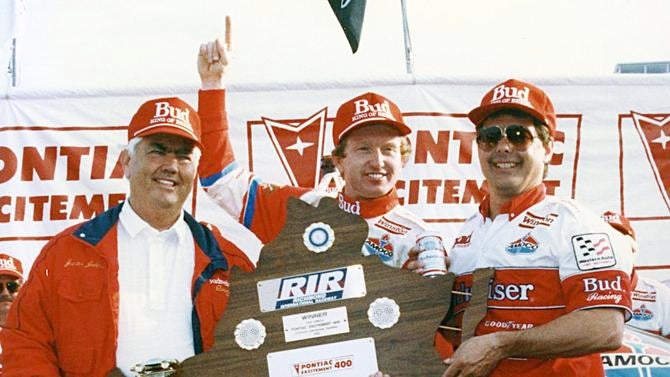
Elliott's ambitions of five in a row ended up being short-lived, as he would spin once early before being collected in another crash and suffering heavy damage later, limping home to a 20th-place finish 40 laps down.
In what would ultimately amount to a severe down year for Dale Earnhardt -- he finished 12th in points, the worst of his tenure with Richard Childress Racing -- the Food City 500 offered a brief glimpse of optimism that Earnhardt could overcome a pedestrian start to the year and contend to win his third Winston Cup title in a row. Earnhardt led laps for the first time all season by pacing the field for 28 circuits, and he was running second and trying to hunt the lead late in the race when he blew a right front tire, sending him into the Turn 2 wall and taking him out of contention and to an 18th-place finish.
Earnhardt was not the only star or frontrunner to have major issues: Daytona 500 champion and Winston Cup points leader Davey Allison led 50 laps, but his race would take a sudden turn when he was penalized a lap for pitting outside of his box. Shortly afterward, things got worse when Allison's car broke an oil line and sent him hard into the Turn 3 wall, triggering a multi-car wreck that also took out Darrell Waltrip, who had battled Allison for the lead and also earned a $10,000 bonus by leading at the halfway point.
The accident would end up injuring Allison's ribs, the first injury of what would end up becoming a year full of physical and emotional agony for the rising star from Hueytown, Ala. The first emotional pains came just a few days before the race, as Allison's grandfather "Pop" passed away that Wednesday after a long battle with cancer. The Bobby Allison Motorsports car driven by Hut Stricklin featured a "Pop" memorial decal on the right side B-post.
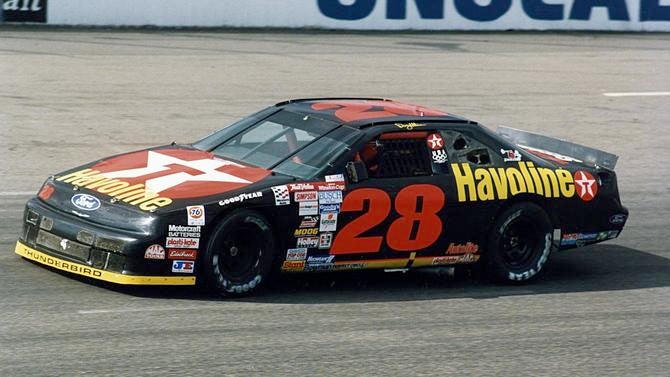
Interestingly, Allison's car would end up finishing the race, but not with him in it due to his injury. With fellow Ford driver Sterling Marlin having fallen out of the race early due to a crash, the Robert Yates Racing team tabbed Marlin to complete the remaining laps in Allison's car once repairs were finished so that Allison could earn additional points and protect his Winston Cup points lead. Despite Marlin driving for Junior Johnson -- thus giving Allison more points and hurting Johnson's chances of eventually winning the Cup title with Elliott -- Johnson allowed the Yates team to use Marlin as a relief driver, and Allison would eventually be credited with a 28th-place finish.
The Food City 500 would turn into a coming-out party of sorts for Joe Gibbs Racing, which was then competing in just its sixth race ever. Dale Jarrett not only put Joe Gibbs' No. 18 up into both the top 10 and top five, but also took the lead late on pit road when he capitalized on a pit road miscue by Alan Kulwicki, who lost time backing up after initially overshooting his pit box. Jarrett led 38 laps, putting an onlooking Gibbs in a position to win for the first time in his sixth try as a NASCAR car owner -- just as he did in the NFL, when he went 0-5 in his first season in Washington in 1981 only to get his first win in Week 6 of that year.
But Jarrett and Gibbs would end up having to take a backseat to Alan Kulwicki. After starting on the pole and leading throughout the day, Kulwicki would take the lead from Jarrett in lapped traffic with 27 laps to go, driving away to earn his first win of the 1992 season and his second-straight at Bristol. Jarrett would finish second with Ken Schrader in third and Terry Labonte in fourth rounding out the just four cars who would finish on the lead lap. Dick Trickle, one lap down, rounded out the top five in fifth.
"It was a great run for us. That's probably the strongest I've ever been for a whole race. And the car worked great right from the drop of the green flag," Kulwicki told ESPN in Victory Lane. "It did just as good as it did in qualifying, really. We didn't change very much. We just had a good run there. I almost messed it up for myself there, we just went over the front line a little bit on the last pit stop and backed up.
"Dale Jarrett gave me a good, hard run at the end there. I had to work pretty hard to get him, but we pulled off a pretty good move in traffic to get it ... We've got a good team and we're looking forward to the rest of the year. Believe me."
Despite losing some of his advantage, Elliott's trying day would allow Allison to maintain a 29-point lead in the Winston Cup standings, while Kulwicki's win moved him up into the top five. Those three would become the primary characters in what many regard as one of NASCAR's greatest season-long championship battles ever, one that would not be settled until the final laps of the final race in Atlanta. Kulwicki would win the championship by 10 points over Elliott, a margin that then marked the closest-ever points battle for the Winston Cup title.
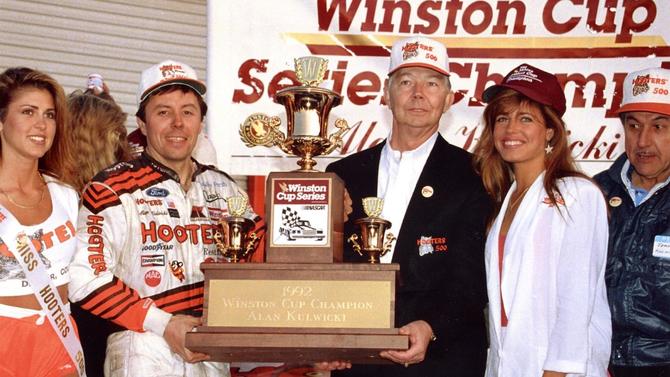
Tragically, Kulwicki would not get the opportunity to defend his Winston Cup title nor his win in the Food City 500. On April 1, 1993, Kulwicki was killed in a plane crash upon approach to Tri-Cities Regional Airport for race weekend in Bristol.
Kulwicki is remembered at Bristol Motor Speedway to this day, as two of his five career Cup victories came there, and the Turns 1 and 2 Kulwicki Grandstand now bears his name. Kulwicki was inducted into the NASCAR Hall of Fame in 2019.
1992 Food City 500 results
- #7 - Alan Kulwicki
- #18 - Dale Jarrett
- #25 - Ken Schrader
- #94 - Terry Labonte
- #8 - Dick Trickle
- #5 - Ricky Rudd
- #21 - Morgan Shepherd
- #12 - Hut Stricklin
- #2 - Rusty Wallace
- #10 - Derrike Cope
- #26 - Brett Bodine
- #15 - Geoff Bodine
- #41 - Greg Sacks
- #55 - Ted Musgrave
- #6 - Mark Martin
- #9 - Dave Mader III
- #30 - Michael Waltrip
- #3 - Dale Earnhardt
- #42 - Kyle Petty
- #11 - Bill Elliott
- #52 - Brad Teague
- #16 - Wally Dallenbach Jr.
- #66 - Chad Little
- #4 - Ernie Irvan
- #17 - Darrell Waltrip
- #68 - Bobby Hamilton
- #43 - Richard Petty
- #28 - Davey Allison
- #33 - Harry Gant
- #1 - Rick Mast
- #71 - Dave Marcis
- #22 - Sterling Marlin














